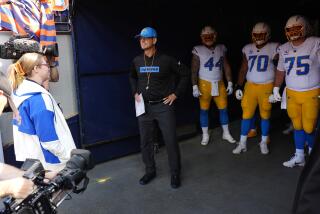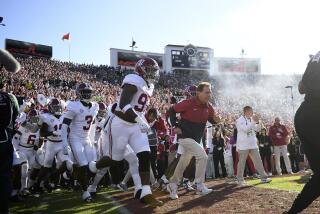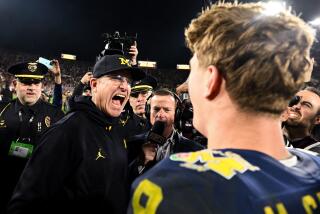BO STILL ON GO : Coach Is Now 60, and Says He Wants to Continue On Until He’s 65
He is the last of the one-name college football coaches, the guy with the gravel-pit voice and dark shades, the oversized headset and sideline scowl, stalking his next opponent like some big-game hunter.
Michigan football Coach Glenn Edward Schembechler--Bo for most of his 60 years--is a man of many moods and nearly as many images. He is a man, said USC Coach Larry Smith, a former Wolverine assistant, to whom “there is no gray, only black and white.”
With Schembechler, it’s not merely what you see is what you get. Often, it’s what you hear. And how you hear it. “There is no facade,” said longtime friend Joe Hayden, a Cincinnati businessman who has known Schembechler since they were freshmen at Miami of Ohio. “He says that if you always tell the truth, you won’t have to remember what you said yesterday.”
The plain truth is that, after 20 years in Ann Arbor, Mich., Schembechler stands at the top of his profession with the most wins (225) among active Division I-A head coaches. But there also are questions concerning his health and future.
Two heart attacks, the first at age 40 after his first season at Michigan and the second two years ago, have made his friends and coaching colleagues ask themselves--and in the case of Ara Parseghian, ask Bo himself--why Schembechler continues to work at a younger man’s game.
“I dropped him a note after the second one and told him that he should seriously think about quitting,” said Parseghian. “I’m sure that the kind of stress he’s under and the kind of lifestyle he leads during the season will take their toll.”
“For some time now, they’ve (doctors, friends) been trying to get me to quit,” Schembechler said this week by telephone from Ann Arbor. “I’ve had two bypass operations, some other episodes in there that indicate I might be taking too many risks and pushing my luck. But I haven’t found the alternative yet.”
It is certainly not just being Michigan’s athletic director, a job Schembechler took with much hesitation 16 months ago when Don Canham retired. “An alternative I’m deeply afraid of,” he said of being a full-time athletic director.
Those who know him said they don’t believe Schembechler can be happy sitting behind a desk, signing expense vouchers for the women’s lacrosse team or glad-handing alumni at fund-raisers. And there is another reason. He wouldn’t want to have to hire his successor.
“I’d be too close to it, and I wouldn’t want anybody to think I was looking over their shoulder,” said Schembechler, who already has taken heat for the manner in which he promoted interim men’s basketball coach Steve Fisher -- after the Wolverines won the national championship last spring. “I wouldn’t want to do it. It would be too tough. And I wouldn’t want to retire. I have too much energy.”
So, he keeps doing the same job he has had since leaving Miami of Ohio--the famed “Cradle of Coaches” that, aside from Schembechler, produced legends such as Paul Brown and Woody Hayes, whom he played under and coached for--to replace Bump Elliott at Michigan for the 1969 season.
That first season established Schembechler’s drill-sergeant reputation. In a time when student protests were almost a daily occurrence in Ann Arbor, he made his players shave their mustaches, cut their hair and play face-mask-to-the-field football. The Wolverines finished the regular season 8-2, beating Ohio State and Hayes for the Big Ten title.
“I was just a wild man that year,” said Schembechler. “I was told my strategy would never make it. We played discipline football. I kicked the crap out of that team. But you know what, when we were out in California (this past January for the Rose Bowl), half of the ’69 team was out there. Most of those guys are my friends now.”
It was in Pasadena on the eve of that 1970 Rose Bowl game against USC (Michigan would lose, 10-3) that Schembechler suffered his first heart attack. At the time, it seemed to be more a bump in the road, more a nuisance than a genuine concern. Seven years later, after the first open-heart surgery, Schembechler spoke jokingly about his doctor, Otto Gago. “He’s fast, and he’s got good hands,” Schembechler said at the time.
But Schembechler doesn’t make jokes about his heart these days. In his recently released autobiography, “Bo: Life, laughs and lessons of a college football coach”, Schembechler wrote, “I will die someday of a heart attack. I’ve pretty much accepted that.” Schembechler’s father, a Barberton, Ohio, firefighter who had heart problems, died of a stroke. At age 60.
Though this Schembechler knows more than just football, he doesn’t seem to have interest in doing anything but coaching it. He loves being at home with his wife, Millie, and the family, but how many leaky faucets can a guy fix?
Privately, some of his friends said they wish he would retire. But they seem to understand why he doesn’t.
“He doesn’t have any more mountains to climb,” said Parseghian, a former Notre Dame coach who gave Schembechler his first major-college assistant’s job--with a Northwestern team that finished 0-9 in 1957. “He finds that this is what he wants to do. But there is a chance they might have to carry him out with feet off the ground.”
Said Smith: “Everyone is concerned (about the heart problem). He’s just doing what he wants to, and that’s important for anybody to enjoy their life.”
Can he foresee himself quitting?
“I’d like to coach until I’m 65,” Schembechler said. “But I’m not sure they’ll let me. It’s a constant battle. I’d miss it. I’d miss it a lot.”
Some are concerned that Schembechler, who has won 12 Big Ten championships--one fewer than Hayes--might be hanging on only to win the one thing that has eluded him: a national championship. It probably won’t happen this year, now that the Wolverines have been beaten by top-ranked Notre Dame, 24-19.
“A national championship is a driving force for everybody in this business,” said Smith, whose title hopes were erased last November by the Fighting Irish. “But it’s not something that I think obsesses him. I think it’s more of an everyday preparation for Saturday’s game that keeps Bo in it.”
Said Schembechler: “It’s not a priority in my life. The national championship is a media event. It’s not a true championship. If you look, most of the schools who have won it the last few years are not affiliated with a conference, the Miamis and Notre Dames. They don’t have to prepare for the conference, so their focus becomes the national championship.”
Schembechler said he doesn’t have the stamina, or even the desire, to outwork the competition anymore, as he did when people like Woody Hayes and Bear Bryant were getting long in the whistle, yet he said Michigan had two of its better recruiting years when he was kept on campus after his heart attacks.
But he said recent stories about his mellowing are overblown.
“Let’s put it this way: My temper was probably a lot worse a few years ago,” he said. “But it’s still there. It doesn’t manifest itself as much anymore. I still have fun, but I’m not as boisterous.”
Said Brent White, senior defensive tackle: “He’s a lot more laid-back than he was when I got here. I guess his philosophy is that if you don’t try to get away with something, or screw up the program, everything will be fine. But when you’re on the field, he’ll still bite your butt off if (you) mess up.”
Schembechler, by watching Hayes fly off the handle when someone had looked at him the wrong way, learned long ago how to channel his temper. “I saw what not to do,” he said. “I tried to separate the great qualities Woody had from the times he did what you didn’t want him to do. I tell the same things to (Bob) Knight. Woody was the same way.”
Still, many have a picture of Schembechler as being a younger version of Hayes, an ornery cuss whose career ended--and forever will be remembered--after he slugged a Clemson player on the sideline during the 1978 Gator Bowl. But those who worked with both coaches said there always was a difference between them.
“He was very intense on the field, but he didn’t have any of the Woody Hayes-type of eruptions,” said Parseghian, who was freshman coach at Miami of Ohio when Schembechler was a senior offensive lineman. “Bo knew when to shut it off.”
Said Hayden: “He was never the person people pictured. He was always a very loving, loyal guy. Bo’s best stories are when he gets to joke about himself. Very few see that, except those close to him.”
It is a picture Schembechler has started to put out for display. Take last Saturday night’s nationally televised game against UCLA at the Rose Bowl. With the Wolverines trailing the Bruins, 23-15, as the clock ticked down inside five minutes, there was Schembechler, arms folded and uncharacteristically calm.
As Michigan began its incredible comeback--forcing a fumble, scoring a touchdown, missing a two-point conversion, recovering an onside kick, marching downfield and, finally, making the game-winning field goal with one second remaining--a smile began to crease Schembechler’s face.
“That doesn’t happen too often, when you win something you shouldn’t have won,” Schembechler said a couple of days later, the joy still apparent. “Football’s great when you win and tough when you lose. That hasn’t changed.”
More to Read
Go beyond the scoreboard
Get the latest on L.A.'s teams in the daily Sports Report newsletter.
You may occasionally receive promotional content from the Los Angeles Times.






